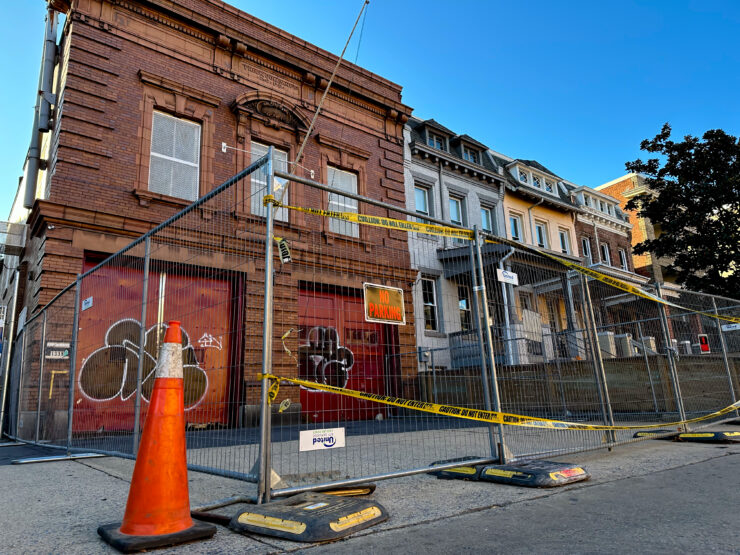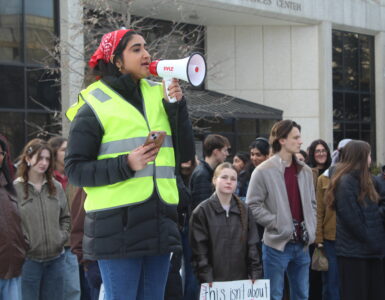On Tuesday morning, Tamika Ortiz, a 54-year-old Columbia Heights resident, was taking out her trash when The Wash asked her how she felt about the stabilization and sobering center opening next door to her. She said she had no idea such a project was happening.
As the District grapples with an escalating substance abuse crisis, city officials are preparing to open a second stabilization and sobering center in Columbia Heights. While the facility aims to reduce the amount of substance abuse in the District, some residents remain skeptical.
“This is not a good location for it. I think it should be somewhere else in a bigger building. This is just not a good neighborhood for it,” Ortiz said.
In February, Mayor Muriel E. Bowser opened the first of two sobering centers at 35 K St. in Northeast D.C., aimed to redirect substance users from jail or emergency room check-ins. In less than a year over 5,000 people have been admitted to the facility.
“There is a big issue with opioids and opioid fatalities in D.C. But alcoholism is the biggest substance use disorder social workers are seeing at Columbia Heights Civic Plaza,” Ward 1 Councilmember Brianne Nadeau said in an email response to The Wash.
The $9.5 million project will replace the historic Old Engine Company No. 11, a fire engine building at 1338 Park Rd. built in the 1900s. The 24/7 center will offer a range of medical services at no cost, including medical clearance, comprehensive bio-psycho-social assessment, sobering and behavioral health support. It also features dormitory space, offices, showers, restrooms, a kitchen and nurse station and observation rooms.
“While patients will come from anywhere in the city, the location in Columbia Heights will help serve some of the people struggling with substance use disorders at Civic Plaza, just a half block away. Many of them have expressed interest in getting sober and this is now an extremely low barrier for getting the help they need and in many cases desire,” Nadeau said.
City officials are eager to move the project forward quickly, but residents still need time to digest what’s being added to their neighborhood.
A community with questions
The project has moved fast with little to no communication with residents on Park Road. Two residents down the street said the most information they’ve received in the past four months was a flyer from the ANC. Other residents on the opposite side of the road said they hadn’t received a flyer or any information about the project.
“Residents just wanted to feel heard at the planning stage and oftentimes in the district, a lot of discussions happen after the fact,” said Anthony Thomas-Davis, Advisory Neighborhood Commissioner representing part of the Columbia Heights neighborhood.
Ortiz said the lack of communication makes her feel like residents’ voices don’t matter to officials, other neighbors confirm she isn’t alone.
Two houses down from the facility Gabrielle Rodriguez said he wasn’t notified about the stabilization center until his neighbor told him about the project.
Rodriguez said many residents — like his neighbor who has lived in Columbia Heights for 30 years, strongly oppose the sober center on a residential street.
“I think people do understand that it’s a great idea but they don’t think it’s the best place for it … I think people don’t feel like the program will have enough funds to sustain it,” Rodriguez said, adding that residents are concerned people will loiter around their homes.
Other longtime residents have gone to Reddit to discuss their concerns, one user said, “I’m just doubtful the city will prioritize something like this.” Another resident commented, “I’m not hopeful about the city’s likelihood to execute something like this in a thoughtful way that integrates the concerns of everyone that lives in the neighborhood, while also assessing the needs of the people for whom this is intended. Especially given the lack of transparency so far.”
Davis, whose mother died from a drug overdose, said while he would like to support the development, he’s conflicted with how successful it will be. His concerns are that the facility is too small to tackle the large numbers of those experiencing substance abuse and that the center should be located in neighborhoods which have experienced higher drug fatalities from the opioid crisis, like Ward 5 and Ward 6.
“I am proud of the fact that we have a resource like this available. However, based on what I’ve heard from the community, based on what I know has not happened up to this point, I oppose it being on a residential street like Park Road,” he said.
Towards the end of the road, John, a resident who has lived in the neighborhood since the ‘90s, said he’s witnessed substance abuse as an issue on their streets making the stabilization center a necessary addition for Columbia Heights, however, he and his wife Tony are nervous about the unknowns of what the facility will bring.
Center at a glance
The D.C. Stabilization and Sobering Center, operated by Community Bridges in partnership with the DC Department of Behavioral Health, serves adults 18 and over experiencing substance use disorder at no charge, insurance or citizenship.
The Wash reached out the DBH to address neighborhood concerns regarding location and lack of communication. The agency said it had held two meetings open to the public to inform residents about the center, the first meeting was May 1, the second meeting took place last Monday, Nov. 25.
”We’ve shown our commitment to keeping the community informed and engaged,” said Phyllis Jones, Chief of Staff, DC Department of Behavioral Health. “We started our engagement at the early days of the project and were going to continue to do that because we think it’s very important that the community has information they need to raise any concerns that they have.”
Individuals in need of the center’s care can visit or be transported to the center if they require stabilization support. Individuals can be referred by the Fire and Emergency Medical Services Department, Metropolitan Police Department, community-based providers, family, friends, or as walk-ins.
When a patient checks in they will receive a medical screening and clearance before trained medical staff can address any immediate care. From there the individual will be connected with a peer counselor or recovery coach, administer crisis stabilization and support services, and coordinate continued care and support upon discharge.
The stabilization center can support up to 22 individuals at one time. The center features 16 recliners for people staying up to 23 hours, and 6 patient beds for individuals staying up to 72 hours with acute substance use disorder needs that need to be observed and monitored.
The Park Road stabilization center has completed the first part of the reconstruction, firehouse cleanup, but there are three other phases it must undergo before a Spring 2026 completion. This includes designing structural preservation plans, performing lead and asbestos abatement, and developing concept design to minimize impact on residential areas, which is funded through the $9.5 million from city funding.
While the development is slated for a Spring 2026 completion, the site itself will not open for operation until funds are properly allocated.















Every concern the community has raised at either of these meetings (the first one was labeled as having a zoom option but no one on zoom could hear anything given DBH didn’t properly set up the necessary technology, by the way – you should ask them about that as most of the people couldn’t participate and couldn’t hear) has been dismissed by Jones or CM Nadeau.
Jones claiming they’ve engaged the community from the very beginning as laughable as Nadeau herself, at the meeting on Nov 25 (there should be a recording you can review), admitted that the community WASN’T engaged prior to the site selection and that she and the mayor made the decision unilaterally and it wasn’t until AFTER the site selection had been made was the community informed.
More transparency is needed. I live two blocks down on Holmead Place and am already dealing with loitering and high a volume of package thefts. I would be willing to to pass out flyers and other materials to keep my neighbors and myself in the loop.